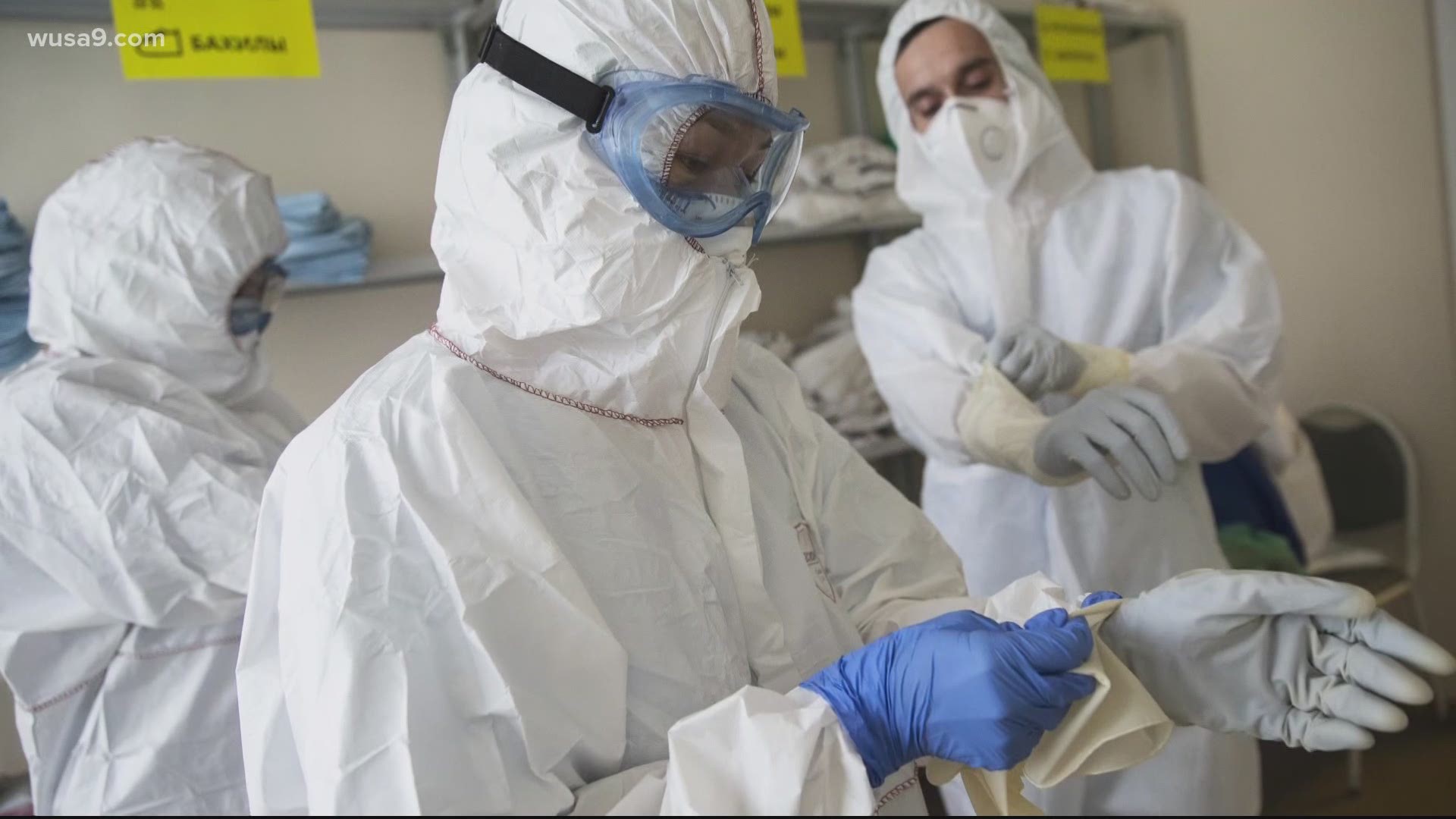FALLS CHURCH, Va. — As Virginia prepares to enter Phase One of its reopening next week, Gov. Ralph Northam touted a stabilization of hospitalization rates and an adequate number of ICU beds to handle a possible second surge of coronavirus across the commonwealth.
With hospital access rare for journalists throughout the capital region, WUSA9 asked critical care Dr. Erik Osborn and cardiovascular intensive care unit nurse Sana Sethi for their perspectives on coronavirus care, two months into the pandemic.
Both Osborn and Sethi work daily as a team at Inova Fairfax Hospital in Falls Church. While they engaged in a wide-ranging Zoom interview with WUSA9, Inova’s PA system notably played the pop anthem "Fight Song," signaling the recovery and discharge of another coronavirus patient.
But both medical professionals expressed a readiness and palpable apprehension as Virginia slowly opens businesses and public spaces on May 15. They predicted the inevitability of an increase in cases after the 15th, but said their unit is ready to confront the challenges ahead.
Below are experts of the interview between WUSA9’s Mike Valerio, Osborn and Sethi, lightly edited for length and clarity.
WUSA9: We’re curious to know if things have somewhat started to calm down, as hospitalization rates plateau? What has life been like for both of you in the past week?
Sana Sethi, RN: I wouldn’t say things have necessarily slowed down. I would say, it kind of comes in waves. Ebbs and flows. I would expect that the worst is pretty much almost behind us. But I wouldn’t say ‘slowing down’ is an accurate measure of where we are, currently.
Erik Osborn, MD: I would agree with that. I think we have adapted very quickly in our team, including nurses and respiratory therapists, ECMO (extracorporeal membrane oxygenation) specialists and leadership has been incredibly supportive. And we’ve adapted to a "new normal."
The hospitalization rates may have plateaued, but there’s still a lot of people, our hospital is still full of patients with COVID infections, and a lot of them are still on ventilators.
Twenty people or so are on ventilators now in our hospital, compared with a high-point of 30 or 40. In total, Inova Fairfax has cared for around 100 coronavirus patients on ventilators since March.
WUSA9: So, what would you say is the best way to describe the environment in which you’re caring for patients now?
Erik Osborn, MD: I would say we’re still in a pandemic national crisis environment. All of the rooms in our ICUs are negative pressure rooms (prevents coronavirus from escaping the room), the majority of them are still filled with COVID-positive patients.
Sana Sethi, RN: As a bedside nurse, I would consider myself to be high-alert. We are very conscious about our PPE, about the current environment that we are taking care of these patients, as well as every time we go into a room, we’re well aware of the risks we’re putting ourselves in to take care of these patients.
So, though the numbers may be plateauing, we are constantly high-alert to protect ourselves and do the best for our patients that we can.
WUSA9: We also want to ask, what’s an indelible experience that you’ll always remember from this time, based on what you’ve seen so far?
Sana Sethi, RN: I currently take care of the youngest patients I ever have in my nursing career, which would be a 16-year-old with coronavirus. To top it off, her father was a couple of doors down, and her mother was in one of the ICU step downs (intermediate care unit).
When you think of having an entire family being in Inova’s care, directly under your care as well, it’s kind of amazing to think this virus is not picky. As young as 16. Their parents, as sick as being on ECMO and being on a ventilator, and multiple different drips to make sure we’re doing everything we can to keep them alive. So that was eye-opening, that this virus really doesn’t discriminate.
Erik Osborn, MD: The mom we’re talking about has made it out of the hospital and made a good recovery. It’s interesting, even though the 16-year-old was young and healthy, she’s taking longer to recover. We think her immune system, certain people who are infected and their bodies have never seen this before, their immune systems go crazy. She is slowly improving, but slower than her mom. She’s on her third week of ECMO, we’re optimistic she’s going to make it because she has age in her favor.


